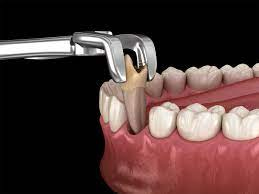What Foods Should You Avoid After Tooth Removal?
Removing a tooth helps relieve pain, prevent infection, and make space for orthodontic treatment or dentures.
After undergoing a tooth extraction, it’s natural to ask, what foods should you avoid after tooth removal? Proper diet plays a crucial role in the healing process and helps prevent complications like dry socket or infection. Eating the wrong types of food too soon can irritate the Tooth Removal site, dislodge the protective blood clot, and delay recovery. Understanding which foods to steer clear of ensures a smoother and more comfortable healing experience.
Why Food Choices Matter Post-Extraction?
Your mouth undergoes trauma during tooth removal, and the extraction site needs time to heal. Certain foods can cause irritation, introduce bacteria, or disrupt the healing blood clot.
Avoiding harmful foods helps by:
Protecting the blood clot that forms in the socket
Reducing the risk of infection and dry socket
Minimizing pain and swelling
Promoting faster, complication-free healing
Eating the right foods while avoiding others makes a significant difference in your recovery timeline.
Foods to Avoid Because They Can Dislodge the Clot:
The most important thing after tooth removal is protecting the blood clot that forms in the socket. Foods that are sticky, crunchy, or require excessive chewing can disturb or dislodge this clot, leading to dry socket, a painful condition.
Avoid these types of foods:
Nuts and seeds — can get stuck in the socket or require intense chewing
Hard, crunchy foods like chips, popcorn, and raw vegetables
Sticky foods such as caramel, chewing gum, and toffee
Chewy meats or foods that require vigorous chewing
Foods with small particles that can lodge in the extraction site, like rice or quinoa
Choosing softer options helps keep the clot intact and supports healing.
Foods That Are Too Hot, Spicy, or Acidic:
Heat and strong spices can irritate the delicate tissue at the extraction site. Similarly, acidic foods can cause discomfort and slow down tissue repair.
Avoid:
Hot beverages and soups (wait until they cool to a lukewarm temperature)
Spicy foods containing chili, pepper, or other strong spices
Citrus fruits and juices like oranges, lemons, grapefruits, and tomatoes
Vinegar-based foods or dressings that can sting the area
Opting for mild, cool, or room-temperature foods reduces irritation and promotes comfort.
Foods That Can Introduce Infection or Cause Poor Oral Hygiene:
After Tooth Removal Treatment, your immune system is focused on healing. Foods that are overly sugary or crumbly can promote bacterial growth, increasing the risk of infection.
Limit or avoid:
Sugary snacks and desserts like candy, cookies, and pastries
Crumbly baked goods such as muffins or scones that leave residue in the mouth
Sticky sweets that cling to teeth and extraction sites
Carbonated drinks and alcohol that can dry out the mouth and delay healing
Maintaining a clean environment in the mouth is key to preventing infection.
Recommended Foods to Eat After Tooth Removal:
While avoiding certain foods is important, focusing on safe, nourishing options will support healing. Ideal foods are soft, easy to chew, and gentle on the extraction site.
Recommended foods include:
Smoothies and shakes (without a straw) packed with fruits and yogurt
Mashed potatoes and pureed vegetables like carrots and squash
Scrambled eggs or soft tofu for protein without chewing strain
Oatmeal, cream of wheat, or other cooked cereals
Soups and broths at lukewarm temperature, avoiding chunks
Applesauce and yogurt for gentle nutrition
These foods provide nutrients while protecting the healing tissues.


